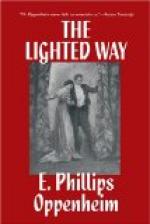“I understand,” he assented. “Whatever you tell me to say, I will say.”
She seemed to be gathering courage. She laughed very softly, as though amused at his earnestness. There was little enough of mirth in her laughter, yet somehow it gave him heart.
“What do these men want?” he asked. “Would you like me to go out and send them away?”
“No,” she replied. “I do not wish you to leave me.”
“But they are terrifying you,” he protested. “What right have they in your garden? They are here, perhaps, as thieves.”
“Hush!”
She sprang away from him. The room was suddenly flooded with light. She was leaning with her arm upon the mantelpiece, a statuette of black ivory in her hand.
“If you are really fond of this sort of thing,” she began, “you should come with me to the South Kensington Museum one day—Who is that?”
The door had opened. It was Mr. Weatherley who appeared. Mr. Weatherley was distinctly fussy and there was some return of his pompous manner.
“My dear Fenella!” he exclaimed. “What on earth are you doing in here, with half your bridge tables as yet unarranged? Your guests are wondering what has become of you.”
“Has any one fresh turned up?” she asked, setting down the statuette.
“A Lady Raynham has just arrived,” Mr. Weatherley replied, “and is making herself very disagreeable because there is no one to tell her at which table she is to play. I heard a young man who came with her, too, asking Parkins what time supper was. I do not wish to criticize the manners of your guests, but really, my dear Fenella, some of them do seem to have strange ideas.”
“Lady Raynham,” she remarked, coldly, “is a person who should be glad to find herself under any respectable roof without making complaints. Mr. Chetwode,” she continued, turning to him, “it is my wish to finish showing you my treasures. Therefore, will you wait here, please, for a short time, while I go and start another bridge table? I shall return quite soon. Come, Samuel.”
Mr. Weatherley coughed. He seemed unwilling to leave Arnold behind.
“I dare say young Chetwode would like a hand at bridge himself, my dear,” he protested.
“Mr. Chetwode shall have one later on,” she promised. “I think that very likely he will play at my table. Come.”
They left the room together. She looked back for a moment before, they disappeared and Arnold felt his heart give a little jump. She was certainly the most beautiful creature he had ever seen, and there was something in her treatment of him, the subtle flattery of her half appealing confidence, which went to his head like wine. The door closed and he was left alone. He listened to their departing footsteps. Then he looked around him, for the first time forming some idea of his surroundings. He was in a very charming, comfortable-looking apartment, with deep easy-chairs, a divan covered with luxurious




